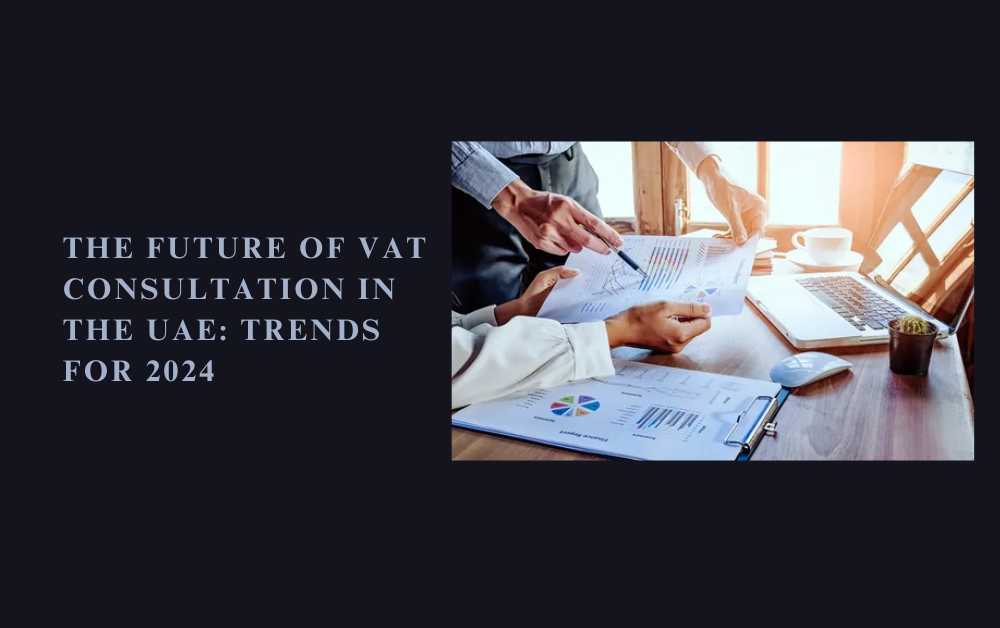
Value Added Tax (VAT) has become a significant aspect of the business landscape in the United Arab Emirates (UAE) since its introduction in 2018. As we step into 2024, the landscape of VAT consultation in UAE is evolving rapidly, driven by various factors such as technological advancements, legislative changes, and shifts in consumer behavior. In this blog post, we’ll delve into the emerging trends shaping the future of VAT consultation in the UAE and what businesses need to know to stay ahead in this dynamic environment.
Understanding VAT Consultation
VAT consultation involves seeking expert advice and guidance on various aspects of VAT compliance, planning, and optimization. It encompasses a range of services, including VAT registration, filing VAT returns, compliance reviews, and strategic advisory to minimize tax liabilities while ensuring adherence to regulatory requirements.
Trend 1: Embracing Digitalization
In 2024, digitalization continues to revolutionize the VAT consultation landscape in the UAE. With the widespread adoption of advanced accounting software, cloud-based solutions, and automation tools, businesses are streamlining their VAT processes and enhancing efficiency. Digital platforms enable real-time tracking of transactions, automated data reconciliation, and seamless integration with tax authorities’ systems, reducing the risk of errors and non-compliance.
Key Takeaways:
- Embrace digital accounting software for efficient VAT management.
- Explore automation tools to streamline VAT processes and minimize errors.
Trend 2: Focus on Compliance and Risk Management
As VAT regulations evolve and become more complex, businesses are placing greater emphasis on compliance and risk management. Consultation firms are offering comprehensive services to help businesses navigate regulatory changes, assess compliance risks, and implement robust control frameworks. Proactive compliance measures not only mitigate the risk of penalties but also enhance the overall financial health and reputation of the business.
Key Takeaways:
- Stay updated on changes in VAT regulations and compliance requirements.
- Implement robust control frameworks to mitigate compliance risks.
Trend 3: Strategic Tax Planning
In 2024, businesses are increasingly recognizing the importance of strategic tax planning in optimizing VAT outcomes. Consultation firms are offering tailored advisory services to help businesses identify opportunities for tax savings, optimize VAT recovery, and structure transactions in a tax-efficient manner. Strategic tax planning goes beyond mere compliance and focuses on maximizing value for the business while staying aligned with regulatory requirements.
Key Takeaways:
- Seek expert advice for strategic tax planning to optimize VAT outcomes.
- Explore opportunities for VAT recovery and tax savings within the legal framework.
Trend 4: Enhanced Client-Centric Approach
Client expectations are evolving, prompting VAT consultation firms to adopt a more client-centric approach. In 2024, firms are focusing on building long-term relationships with clients by understanding their unique needs, providing personalized solutions, and delivering exceptional service. Enhanced communication channels, proactive engagement, and timely responsiveness are becoming the hallmarks of successful VAT consultation practices.
Key Takeaways:
- Choose a VAT consultation firm that prioritizes client satisfaction and engagement.
- Look for proactive communication and personalized service offerings.
Trend 5: Expansion of Industry Specialization
As industries navigate unique VAT challenges, there is a growing demand for industry-specific expertise in VAT consultation. Firms are expanding their service offerings to cater to the specialized needs of sectors such as real estate, healthcare, hospitality, and e-commerce. Industry-specialized consultants bring in-depth knowledge of sector-specific regulations, practices, and challenges, enabling businesses to address VAT complexities more effectively.
Key Takeaways:
- Seek VAT consultation firms with expertise in your industry vertical.
- Leverage industry-specific insights for tailored VAT solutions and advice.
Conclusion
As we look ahead to the future of VAT consultation in the UAE, it’s clear that businesses need to adapt to emerging trends and evolving regulatory landscapes. Embracing digitalization, focusing on compliance and risk management, strategic tax planning, adopting a client-centric approach, and leveraging industry specialization are key strategies for navigating the complexities of VAT in 2024 and beyond. By staying informed, proactive, and partnering with the right VAT consultation firm, businesses can optimize their tax outcomes and drive sustainable growth in the dynamic business environment of the UAE.
Note :- For more insightful articles related to this topic, feel free to visit www.incnewsblogs.com.






